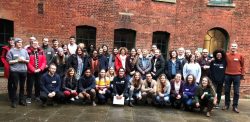Date: 11/12/2019
Megan Ison is a PhD student funded by the ESRC South Coast Doctoral Training Partnership in the Area Studies department at the University of Portsmouth. Her research looks at the politics of memory at the commemorative site of Oradour-sur-Glane, France.

Suncream on, hair braids in and sunglasses packed. I’m festival ready, right?
Not exactly, for this was a festival with a twist…
The first SC DTP methods festival took place Monday 25th – Tuesday 26th November 2019 and was hosted at the Napoleonic-era Fort Purbrook, on the outskirts of Portsmouth. Gratefully, tents and empty beer cans were nowhere to be seen drifting aimlessly on the horizon of Portsmouth’s own ‘Maginot line’. Instead, closing our eyes to listen to the sound of an old flagpole flapping in the wind against the walls of the fortified courtyard during a sound walk, was one of #methfest’s headliner acts.
Despite the chilly winds and gloomy rain clouds that are typical of November on the South Coast, interactive workshops and presentations on quantitative and qualitative methods over the two-day event had the crowd going wild. Well, perhaps eager notetaking and question-asking is a more accurate description. But that doesn’t have quite the same visual impact, does it? Although, the visuality of the body mapping session in the qualitative room did make a powerful impression on me. Indeed, it has encouraged me to reflect on my research trajectory towards becoming interdisciplinary.
Interdisciplinary research is the foundation of the South Coast Doctoral Training partnership, a value for which I love being a cohort member. The past decade has witnessed a shift in the UK Higher Education System towards interdisciplinarity, in response to the neo-liberal commodification of culture and the global crisis of the Humanities. This means that although my research roots are in French History, my doctoral research as an SCDTP student encourages me to engage with important research questions that are taking centre stage in Anthropology, too.
Exposure to the different methods that are used by my peers within the DTP during events such as these, motivates me to learn new social science methods and methodologies that I can ‘borrow’ and adapt in my own work. For example, I enjoyed the aforementioned sound walk session led by a colleague from urban culture and community studies, because it made me think about the ways in which I could use this ethnographic method for data collection at Heritage sites in France. I was also inspired by a talk led by Business and Enterprise students from Brighton, about decolonising the curriculum.
Indeed, this thought-provoking talk made me wonder: how ‘decolonised’ actually are the disciplines today? Taking the idea of ‘decoloniality’ out of its historical context of European colonisation and its aftermath, my mind drifted to ponder the ways in which dominant discourses about ‘best practice’ for research are constructed and legitimised within the academy. I arrived at an uncomfortable paradox. On the one hand, the academy is calling to storm the barricades of discipline exclusivity to embrace ‘outsiders’ at the height of the turn towards interdisciplinary, whilst on the other hand the draw bridges are being pulled up tighter than ever in defence of keeping insiders within disciplines as ‘natural’, and de-hybridised, as possible.
Working in this current climate, throughout my first year of social research methods training I felt like a historian wearing the mask of a social scientist that didn’t quite fit. This academic identity crisis can be understood by Pierre Bourdieu’s sociology of hysteresis, which helps an individual to point out the disjunction between ‘habitus’ (one’s sense of self), and the field(s) within which one acts (institution). I do feel as though the academy and its PhD students don’t talk enough about the messiness inherent in the process of negotiating an interdisciplinary identity. Instead, interdisciplinary is taken for granted as a dominant discourse that is very popular at the moment, despite interdisciplinarity being a concept that is problematic and difficult to define, thus its social meaning also lacks clarity.
Nevertheless, whilst cobbling together dinner in the Fort Purbrook kitchen may have not fit the bill of a conventional academic knowledge exchange, socialising with my DTP peers brought method to my madness of taking part in a social science research methods festival as a historian. Outside the walls of the academy in the dining room of an old fort; sociologists, psychologists, human geographers, politicians etc and myself, the historian, were talking to each other informally about how we would approach each other’s research topics using our own disciplinary methods. This discussion was continued during a presentation delivered by myself and my colleague from Area Studies, during which I explained the value that Humanities research methods (especially archives) can bring to a social science project. The taboos of disciplinary exclusivity that we avoid talking about in our daily work lives, were addressed here so openly and productively.
This allowed internalised thoughts of ‘am I interdisciplinary enough? that I am sure many of us share, to be deconstructed and discussed in the context of the first SCDTP research methods festival in such a refreshing way. On our way to becoming open-minded and well-rounded researchers, humanities students considering applying for doctoral research should certainly consider the SC DTP. Fingers crossed for another methods festival next year, where the conversation about interdisciplinarity can continue!